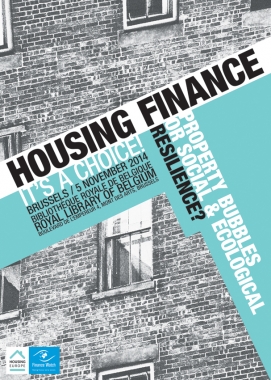Housing Finance: Property Bubbles or Social & Ecological Resilience?
It’s a choice!
Brussels, 5 November 2014Save the date
5 November 2014, Bibliothèque Royale de Belgique (Royal Library of Belgium), Boulevard de l'Empereur 2, Mont des Arts, Brussels PROGRAMME NOW AVAILABLE, ALL 22 SPEAKERS ANNOUNCED!
Housing has been in the core of the financial crisis since its very beginning. The real estate bubble burst affecting the lives of millions of people across the globe. After six years of mainly failed political initiatives and measures to stabilize the situation, Housing Europe teams up with "Finance Watch" and invites all major stakeholders and decision makers in November to Brussels for an international conference. The event aims to explore the paths that may lead the housing finance from the bubble effect to resilience. How can the Euro-Zone Debt Crisis be turned into an Ecological and Social Recovery?
Event goals
- Evaluation of measures put in place to avoid a repeat of property bubbles that helped fuel the euro zone's debt crisis and the on-going fallout.
- Informing new MEPS on the opportunities they now have to help ensure that much needed finance is channelled into ensuring affordable access to energy efficient housing as part of the ‘real’ economy;
- Clarity on the role of affordable housing as an investment with high social, environmental and economic returns for public authorities and an ethical investment option for private investors;
- Discussing the approach to housing from the European Union
Thematic Sessions
- Making finance available for housing needs
There is no getting away from the fact that social, public and cooperative housing, whether we consider new construction or refurbishment is a capital intense activity. Collaboration between those who provide the housing and those who provide the capital is unavoidable and having the right policy framework is vital. The incentive structure within much of the banking sector makes ever increasing returns on investment the objective.
The result of this was made clear to all when the bubble burst in 2008. In session one, we will look at this phenomena and evaluate whether measures like the Banking Union and European Commission’s communication on long-term Financing of the European Economy will adequately address this and other reasons why banks are not financing more affordable and social housing, what is being done and to change this and what additional measures are needed?
- Why market solutions for housing are not sufficient
An adequate housing infrastructure is needed for our societies and economies to function sustainably. In this session we will consider the wider social impact of housing policies, drawing from the concrete experiences of some Member States, covering the extreme examples of housing policies which contributed to the economic boom and bust resulting in high social costs and human suffering and housing policies which can be the driver of social innovation and economic resilience.
- Do we need another approach to the housing crisis from the European Commission?
The EU does not have competence in housing however EU policies are not housing-neutral. Via, for example, the European economic surveillance procedures (European Semester) recommendations are delivered to Member States on housing. It is vital that such recommendations take into account the co-benefits of effective housing policies and are not limited to short-term macro-economic and budgetary considerations. Other EU initiatives like the long-term financing communication and the Banking Union stated aim is to ensure a more stable financing framework. What needs to be done at European level to ensure that they deliver?
Programme
08:30 - 09:30 Welcome Coffee and Registration
09:30 - 10:00 Introductory Remarks
- Philippe Lamberts, MEP, Co-Chair of the Group of Greens/European Free Alliance
- Marc Calon, President of Housing Europe
- Benoît Lallemand, Secretary General of Finance Watch
10:00 - 11:45 Session one: Making finance available for housing needs
Background: There is no getting away from the fact that social, public and cooperative housing, whether we consider new construction or refurbishment is a capital intense activity. Collaboration between those who provide the housing and those who provide the capital is unavoidable and having the right policy framework is vital. The incentive structure within much of the banking sector makes ever increasing returns on investment the objective.
The result of this was made clear to all when the bubble burst in 2008. In session one, we will look at different ways social housing is being financed and evaluate whether measures like the Banking Union and European Commission’s Communication on long-term Financing of the European Economy will help to foster adequate instruments. We will ask why more banks are not financing more affordable and social housing, what is being done and to change this and what additional measures are needed?
Moderator: Manuel Aalbers, KU Leuven, University of Leuven
- The point of view of housing practitioners: presentation of Scottish Social Housing Lending Vehicle and Revolving Development Fund, Susan Torrance, OBE, Policy Manager, Scottish Federation of Social Housing (Housing Europe Member)
- The point of view of the public finance providers: Laurent Leger, Caisse des Depôts, French Public Bank and Brian Field, European Investment Bank
- Almoro Rubin de Cervin, DG MARKT, European Commission
- Reaction from Aline Fares, Finance Watch expert
11:45 – 12:00 Coffee break
12:00 - 13:15 Session two: Why market solutions for housing are not sufficient
Background: An adequate housing infrastructure is needed for our societies and economies to function sustainably. In this session we will consider the wider social impact of housing policies, drawing from the concrete experiences of some Member States and cities, covering the extreme examples of housing policies which contributed to the economic boom and bust resulting in high social costs and human suffering and housing policies which can be the driver of social innovation and economic and ecological resilience.
Moderator: Gene Clayton, Chair of Irish Council of Social Housing (Housing Europe Member), Chair of Housing Europe’s Economic Committee
- The long-term costs of the housing crisis - Drawing the lessons from Spain: Javier Buron Cuadrado, Housing Policy Expert & Director of URBANIA ZH GESTION (Urban Planning Consultancy) Spain
- Drawing Lessons from Austria on why is makes economic, social & environmental sense to invest in non-profit Housing, Karin RAMSER, deputy CEO of ‘Wiener Wohnen’ – ‘Vienna Housing’
- Grass roots innovative solutions to housing finance: Charlotte Boulanger, Project officer European program Resolutions to fund cities, Global Fund for Cities' Development
13:15 - 14:30 Lunch break
14:30 - 16:30 Session three: Do we need another approach to housing from the European Union?
Background: The EU does not have competence in housing however EU policies are not housing-neutral. Via, for example, the European economic surveillance procedures (European Semester) recommendations are delivered to Member States on housing. It is vital that such recommendations take into account the co-benefits of effective housing policies and are not limited to short-term macro-economic and budgetary considerations. Other EU initiatives like the long-term financing communication and the Banking Union stated aim is to ensure a more stable financing framework. What needs to be done at European level to ensure that they deliver? On the practical side, EU funding instruments and institutions are increasing a source of finance for housing providers.
Moderator: Laurent Ghekière, L'Union Sociale pour l'Habitat (Housing Europe Member) Representative to the EU
- Christophe André, OECD; The Organisation for Economic Cooperation and Development, Peter Pontuch, DG Economic and Finance Affairs, European Commission;
- Panel Discussion: Housing Europe’s members from the Netherlands, Sébastien Garnier, AEDES, from Sweden, Johanna Ode, SABO and from the UK, Arno Schmickler, NHF Samara Jones, FEANTSA (the European Federation of National Organisations working with the Homeless) Barbara Steenbergen, IUT, International Union of Tenants.
- Reflections from the European Parliament on the ways forward: Paul Tang, MEP (NL), Pervench Berès, MEP (FR)
Closing Remarks on next steps from Housing Europe and Finance Watch.

